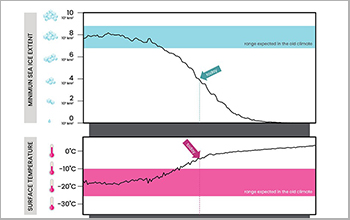搜索结果: 1-15 共查到“大气科学 Arctic”相关记录122条 . 查询时间(0.125 秒)

Researchers set to take to the air above the Arctic and New York City(图)
air above Arctic New York City
font style='font-size:12px;'>
2020/10/10
Atmospheric scientists are embarking on two new research projects supported by the U.S. National Science Foundation that involve using sophisticated planes to understand the atmospheric chemistry and ...

Fast-warming Arctic transitioning to new climate state(图)
Fast-warming Arctic transitioning new climate state
font style='font-size:12px;'>
2020/9/25
The fast-warming Arctic has started to transition from a predominantly frozen state into an entirely different climate, according to a comprehensive new study of Arctic conditions.Weather patterns in ...

Carbon dioxide levels are rising across wide swaths of the Arctic Ocean's Canada Basin(图)
Carbon dioxide levels rising across wide swaths Arctic Ocean Canada Basin
font style='font-size:12px;'>
2020/7/10
Melting of Arctic ice caused by climate change has exposed more sea surface to the atmosphere. Scientists have long suspected this trend would increase carbon dioxide in Arctic Ocean waters.Now U...

Research expedition faces extreme conditions in fast-changing Arctic
Research expedition extreme conditions fast-changing Arctic
font style='font-size:12px;'>
2020/4/29
In October 2019, scientists froze a ship filled with equipment into Arctic sea ice with the intention of drifting across the Arctic Ocean for a full year, gathering data on polar atmosphere, ice and o...

A relationship between severe winter weather and Arctic warmth?(图)
relationship between severe winter weather Arctic warmth
font style='font-size:12px;'>
2020/2/20
A new review article published in Nature Climate Change evaluates whether severe winter weather in the United States, Europe and Asia is sensitive to Arctic temperatures. The lead author is NSF-funded...
MULTI-SCALE CHANGE ANALYSIS OF SEA ICE EXTENT IN ARCTIC
Arctic Sea Ice Extent Multi-Scale Change Analysis Melting Rate Change Cycle
font style='font-size:12px;'>
2018/5/15
The extent of polar sea ice is one of the key parameters of cryosphere and polar environmental change, which plays an important role in the study of global climate change. In this paper, the monthly p...
Rapid decline of Arctic sea ice a combination of climate change and natural variability
Rapid decline Arctic sea ice climate change natural variability
font style='font-size:12px;'>
2017/3/30
Arctic sea ice in recent decades has declined even faster than predicted by most models of climate change. Many scientists have suspected that the trend now underway is a combination of global warming...
Rapid Arctic warming has in the past shifted Southern Ocean winds
Rapid Arctic warming past shifted Southern Ocean winds
font style='font-size:12px;'>
2017/2/15
The global climate is a complex machine in which some pieces are separate yet others are connected. Scientists try to discover the connections to predict what will happen to our climate, especially in...
Climate Change:Greenland Melting Tied to Shrinking Arctic Sea Ice
Climate Change Greenland Melting Shrinking Arctic Sea Ice
font style='font-size:12px;'>
2016/4/13
Vanishing Arctic sea ice. Dogged weather systems over Greenland. Far-flung surface ice melting on the massive island.These dramatic trends and global sea-level rise are linked, according to a study co...
NSF funds new $5.9 million Arctic data center at the University of California,Santa Barbara
NSF Arctic data center University of California Santa Barbara
font style='font-size:12px;'>
2016/3/28
The National Science Foundation (NSF) has made a five-year, $5.9 million award to a national partnership, led by the National Center for Ecological Analysis and Synthesis (NCEAS) at the University of ...
Arctic snow not darkening due to soot,dust,Dartmouth-led study finds
Arctic snow soot dust Dartmouth-led
font style='font-size:12px;'>
2015/11/12
For millennia, Greenland's ice sheet reflected sunlight back into space, but satellite measurements in recent years suggest the bright surface is darkening, causing solar heat to be absorbed and surfa...
Ancient shark teeth give clues to future of Arctic climate change
Sharks The North Pole. Tundra Animal Temperate forests Temperature The ocean Deep sea
font style='font-size:12px;'>
2014/7/18
A new study of sharks that lived in warm Arctic waters millions of years ago suggests that some shark species could handle the falling Arctic salinity that may come with rising temperatures.
Evaluation of stratospheric chlorine chemistry for the Arctic spring 2005 using modelled and measured OClO column densities
stratospheric chlorine chemistry the Arctic spring 2005 OClO column densities
font style='font-size:12px;'>
2011/2/24
Chlorine dioxide, OClO, column amounts retrieved from measurements of the SCIAMACHY satellite instrument are presented and validated by comparison with simultaneous ground-based DOAS observations. In ...
An Arctic CCN-limited cloud-aerosol regime
airborne aerosol particles the Earth's surface
font style='font-size:12px;'>
2011/1/19
On average, airborne aerosol particles cool the Earth's surface directly by absorbing and scattering sunlight and indirectly by influencing cloud reflectivity, life time, thickness or extent. Here we ...
Light-absorbing impurities in Arctic snow
Light-absorbing impurities Arctic snow
font style='font-size:12px;'>
2010/12/28
Absorption of radiation by ice is extremely weak at visible and near-ultraviolet wavelengths, so small amounts of light-absorbing impurities in snow can dominate the absorption of solar radiation at t...

